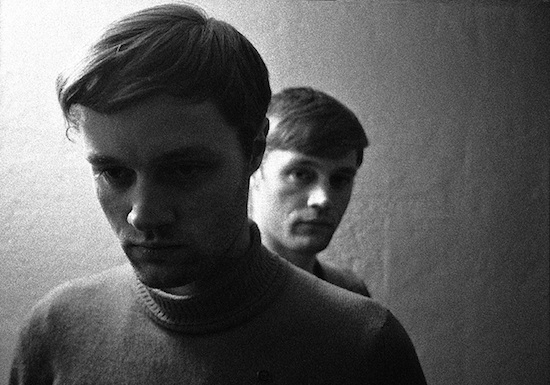"Calling our new single ‘Bill Drummond’ is cutting to the chase – we were going to call it ‘Hey Bill (Come With Me)’, but this saves any ambiguity," grins Erik Sandberg, singer and songwriter in Glasgow band Wake The President.
Its video puts any doubts about the inspiration for the song – which is released as a split seven inch with Casual Sex’s ‘North’, on the We Can Still Picnic label run by Erik and twin brother and bandmate, Bjorn – firmly to bed. Filmed on the Isle of Arran, because, unlike Bill Drummond, the band doesn’t have money to burn to go all the way to Jura, it features Erik canvassing local opinion about the ex-KLF man’s most infamous act of art-terrorism. The humour of the video mirrors the song, which is equal parts playful and slightly menacing, all woozy organ and unexpected stops, starts and time signature changes. It marks a change of attitude since the band’s brooding, intense LP Zumutung!, which was released in late 2011.
"I thought that if it is a song loosely about Bill Drummond and the art that inspires him, why not go to the Western Isles and do a video of me asking folk about him burning the money," says Erik. "It only cost us about £100 that video and it was such fun to make…"
With their third LP set to be recorded at the start of 2013, and ‘Bill Drummond’ their strongest release to date, next year could be a big one for the band. And they’re aiming high. "Look at Field Music, they are an inspiration, getting a Mercury nomination for their fourth album," says Erik. "Too many people consume music of low quality. They don’t care about the tones of a dulcimer or the thickness of the bass, they just want to hear a catchy lyric they can hum on the way to work or school. And as the quality is going down, the amount being produced is going up – it is almost drowning what is actually being released…"
You’ve written a song called Bill Drummond – erm, why?
Erik Sandberg: It was kind of weird, actually. I started writing the song three or four years ago. Have you heard of an environmental artist called Richard Long? I went to his retrospective at Tate Britain and around the same time, I just happened to be reading about Bill Drummond – and how his favorite artist is also Richard Long, who leaves bits of stone in his path as part of his art. I wrote a couple of verses and a chorus about it, but it didn’t work on the second album. I ended up finishing the song later, after a really odd dream about Bill Drummond, which I took as a sign to get it out there.
So are you a big Bill Drummond fan?
ES: I’m not a massive KLF fan, but he worked with a Scottish band called Strawberry Switchblade back in the day who were peripherally involved with the whole Postcard Records movement. So that gets brownie points from me. Also, Alan McGee was a massive fan of and released a solo album of his, he managed The Teardrop Explodes and Echo & the Bunnymen, plus he was involved with Zoo Records who I just love. So I guess, taking all these things combined, he is a pretty high achieving Scottish guy.
Why the split seven inch format?
ES: We are going to do a European tour together early next year, so doing a split seven inch and splitting the tour costs just makes sense. And it is fun because you are doing it with your friends. Both sides sound great.
As someone new to Glasgow, I imagined a tight, vibrant indie scene following the long tradition here… what’s the reality?
ES: At the moment I know of about half-a-dozen circles of friends who are making music in Glasgow and they overlap at certain junctures. I respect all of the Glasgow groups, I don’t like all of them, but they are all ploughing their own furrow and I’d love to see them all succeed. There is no scene, though. Every group is different; it is quite disparate. We recently released a compilation 12" LP with eight different Glasgow bands and had a massive party/gig to celebrate it. All we want to do is try and help where we can and maybe run a club to augment the records we release.

Erik Sandberg on location in Arran while shooting the video for ‘Bill Drummond’
Tell us about your club night…
ES: Our club night’s called Mao Disney, it’s been great fun. If we make any profit we can put it towards the seven inch pressing or the studio, and in this day and age, you can’t just have one thing going on. Everyone is in a band, what else do you do? Designing the posters is another tangible thing to be proud of. [Mao Disney venue] The Poetry Club itself was designed by a well-known artist, Jim Lambie. He was in a band called The Boy Hairdressers. It’s been a great thing for Glasgow and is bringing people together like never before. We’ve just had Vic Godard and James Kirk from Orange Juice collaborating…
Who are the bands that have influenced you? Are Orange Juice one of them…?
ES: Yeah, but it changes from day to day. Lyrically the first two Belle and Sebastian records were absolutely perfect. You can say what you want about that group, but lyrically they’re unrivalled. They’re a big influence on me. A literary band. With me, the words usually come first – I read a book, take a line from it that I like, and that’ll usually set off a series of emotions which will get the song off and running. And The Pastels have existed for so long because they have done it at their own pace whilst constantly releasing the highest standard of music. They are not millionaires, but they have the highest respect from their peers and people have been influenced by them all over the world.
I think a lot of the time your destiny is in your own hands, you just need to make the choice on what path to take. Groups from Scotland don’t really chase it as much.
What counts as success – you’re about to record your third album, you have your label and club, but how do you measure where you are at in your career?
ES: That’s difficult to describe for me because I’m extremely ambitious, but not very competitive. If I was 20 years old, to get a seven inch out would be an amazing thing. But now I’ve got higher aspirations, I’m never happy, never content with what I’ve achieved.
We’re self-producing for the first time so the third album is taking a bit longer to get finished. I can hear the third album in my head, but I think when you are making an LP you should do at least two or three rounds of demos before you start pre-production. We are still at a very embryonic stage.
Music is an intangible aural thing – it is possibly the purest art form, because you can grab a canvas and you can’t grab a song. But you can grab a vinyl, so LPs are magical. To paraphrase from a film I saw recently, LPs are like little flagpoles in the history of pop music.
How important is independence to you?
ES: We are our own bosses, we release what we want. It’s funny, a guy said the other day said "Erik – vinyl, fanzines, the whole culture you believe in is finished, don’t you understand that?" Well, no, I don’t. It might be futile, but we have to keep kicking against the pricks. Because if we give up, I know it sounds incredibly idealistic, then it’s all over. Show your kids and your friends what a seven inch record looks like and get them into it. I teach guitar and I’ve bought all my students a 45 for Christmas…



